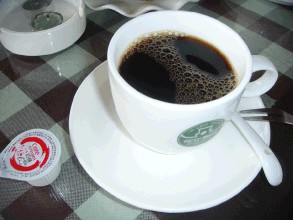Jamaica fine coffee bean flavor with persistent fruit flavor
Jamaican Blue Mountain Coffee is harvested every year from June to November, usually by hand. After picking, it goes through the processes of washing, peeling, fermentation, dehydration, sun drying, shelling, and baking before you can get a ripe blue mountain coffee bean. In the process of raw bean processing, there are special personnel responsible for quality supervision in each step. For the very precious Blue Mountain Coffee, the packing and transportation mode adopted by the Jamaican government is also different. Unlike other coffees, Blue Mountain Coffee is not packed and transported in cloth bags at 60kg / bag, but in wooden barrels at the standard of 70kg / barrel. Jamaica is also the last country to still transport coffee in traditional wooden barrels. Jamaican Blue Mountain coffee beans must obtain a certificate of quality recognition issued by the Jamaican Coffee Industry Committee, which is the only body in Jamaica authorized to issue such a certificate. And each batch of export will have special quality supervision experts responsible for sampling, baking, grinding and brewing coffee, and finally make a judgment on whether to meet the standard. Because of its high price, Blue Mountain Coffee has a relatively fixed consumer group, and its market is mainly concentrated in Japan, followed by some European and American countries. Coffee beans are full in shape and slightly larger than ordinary beans. Its taste is very subtle, sour, fragrant, mellow, sweetness is uniform and strong, slightly bitter, harmonious taste, excellent flavor, suitable for individual coffee. It uses medium roasting (Medium Roast) to maximize the original taste of the coffee and enhance its aftertaste. In recent years, with the improvement of domestic coffee consumption, a large number of cafes have begun to supply "Blue Mountain Coffee", and its price is often only a fraction or a tenth of that of authentic Blue Mountain coffee. In 2005, under the guidance of Taiwan coffee manufacturers, a large number of domestic media began to pay attention to and report the authenticity of Blue Mountain Coffee. So far, authentic Blue Mountain coffee is still out of reach of most domestic consumers because of its price and supply in the mainland market. Blue Mountain Coffee can maintain its top status today, which is closely related to the local management policy. In 1932, Jamaica reduced the island's dependence on sugar exports through policies to encourage coffee production. Unlike most coffee-producing countries, the local government does not plant a large number of high-quality and poor-quality coffee in order to increase the output, but prefer to sacrifice the output to ensure the quality. Therefore, Jamaica is one of the countries with low coffee production in the world. Brazil, the world's largest coffee exporter, produces 30 million bags of coffee a year, while Blue Mountain produces only about 40, 000 bags a year.
One might ask, what is so special about Jamaican Blue Mountain Coffee? The answer is everything about it. The real Blue Mountain Coffee is one of the most advantageous coffee growing conditions in the world. The weather, geological structure and topography of Jamaica provide a unique ideal place. The designated Jamaican Blue Mountain Coffee can only be grown in the Blue Mountain area, north-east of the island of Jamaica in Kingston. Coffee grows on a mountain with a maximum height of 1800 meters (almost 6000 feet), which is already quite high for small-grain coffee, and the mountains are very uneven and the process of harvesting is very difficult (coffee harvesting is almost entirely female). The tree is mainly small grain "Geisha High Bred" type. Seeds from these trees have been exported to other countries, such as Hawaii, Kenya, Papua New Guinea and elsewhere, but they are no longer able to create the flavor of Blue Mountain coffee beans anywhere. In the steep and high-altitude mountains, careful farming and harvesting, all Jamaican Blue Mountain coffee is ground, tasted and distributed by the Jamaican Industry Association. The coffee in the cup tastes very clean, and it is one of the sweetest coffees in the world

Important Notice :
前街咖啡 FrontStreet Coffee has moved to new addredd:
FrontStreet Coffee Address: 315,Donghua East Road,GuangZhou
Tel:020 38364473
- Prev

Panamanian Kasha Coffee Flavor and taste introduction to boutique coffee beans in the manor area
In 1931, he obscure exported Kenya from Geisha Mountain Mountain in southwestern Ethiopia to Tanzania and Costa Rica, then transplanted to Panama in the 1960s, and then went through nearly half a century before he became a blockbuster, defeating the victorious armies such as Bourbon, Kaddura, Kaduai, Tibica and so on, winning 2005 in one breath.
- Next

Acidity and texture of Ethiopian Coffee Manor Flavor characteristics of Fine Coffee beans
In Ethiopia, the grading and quality control system of coffee is divided into three levels: producer, regional and national. All coffee is inspected by local inspection agencies before leaving the country of origin, and then re-tested at the coffee inspection and grading centers in Addis and Diredawa to determine its quality grade. Coffee is graded before auction and sale, for all involved in production, acquisition,
Related
- Detailed explanation of Jadeite planting Land in Panamanian Jadeite Manor introduction to the grading system of Jadeite competitive bidding, Red bid, Green bid and Rose Summer
- Story of Coffee planting in Brenka region of Costa Rica Stonehenge Manor anaerobic heavy honey treatment of flavor mouth
- What's on the barrel of Blue Mountain Coffee beans?
- Can American coffee also pull flowers? How to use hot American style to pull out a good-looking pattern?
- Can you make a cold extract with coffee beans? What is the right proportion for cold-extracted coffee formula?
- Indonesian PWN Gold Mandrine Coffee Origin Features Flavor How to Chong? Mandolin coffee is American.
- A brief introduction to the flavor characteristics of Brazilian yellow bourbon coffee beans
- What is the effect of different water quality on the flavor of cold-extracted coffee? What kind of water is best for brewing coffee?
- Why do you think of Rose Summer whenever you mention Panamanian coffee?
- Introduction to the characteristics of authentic blue mountain coffee bean producing areas? What is the CIB Coffee Authority in Jamaica?

